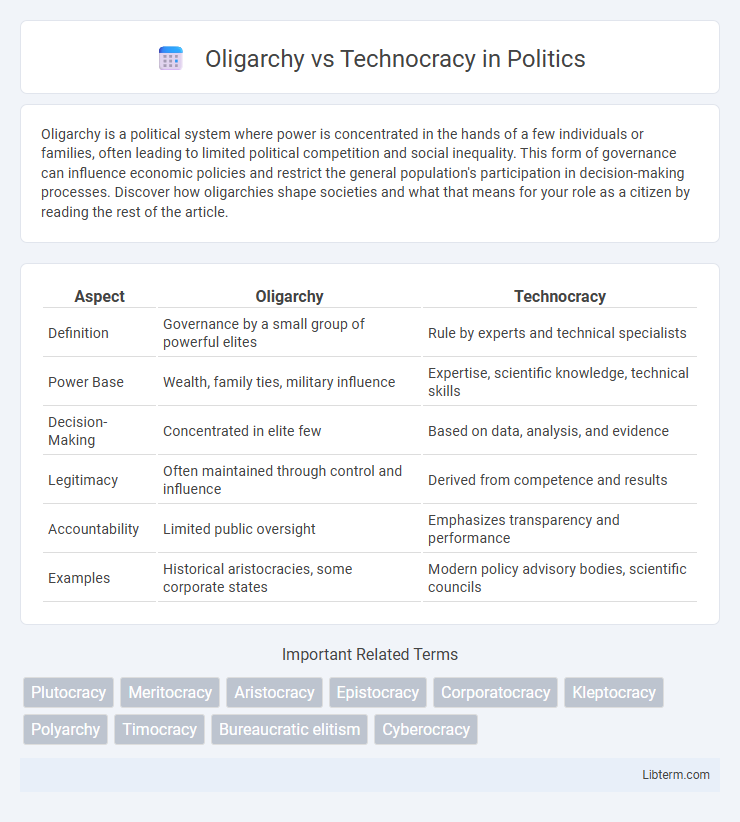Oligarchy is a political system where power is concentrated in the hands of a few individuals or families, often leading to limited political competition and social inequality. This form of governance can influence economic policies and restrict the general population's participation in decision-making processes. Discover how oligarchies shape societies and what that means for your role as a citizen by reading the rest of the article.
Table of Comparison
| Aspect | Oligarchy | Technocracy |
|---|---|---|
| Definition | Governance by a small group of powerful elites | Rule by experts and technical specialists |
| Power Base | Wealth, family ties, military influence | Expertise, scientific knowledge, technical skills |
| Decision-Making | Concentrated in elite few | Based on data, analysis, and evidence |
| Legitimacy | Often maintained through control and influence | Derived from competence and results |
| Accountability | Limited public oversight | Emphasizes transparency and performance |
| Examples | Historical aristocracies, some corporate states | Modern policy advisory bodies, scientific councils |
Understanding Oligarchy: Definition and Core Principles
Oligarchy is a form of government where power is concentrated in the hands of a small group of individuals, often distinguished by wealth, family ties, or military control. Core principles of oligarchy include limited political participation, centralized decision-making, and the prioritization of the ruling elite's interests over the broader population. This system contrasts with technocracy, which emphasizes governance by experts and technical knowledge rather than inherited or economic power.
Defining Technocracy: Key Concepts and Framework
Technocracy is a governance system where decision-making authority is vested in experts and specialists based on their technical knowledge and expertise, emphasizing efficiency and data-driven policies. Unlike oligarchy, which concentrates power among a small, elite group often based on wealth or social status, technocracy prioritizes scientific methods and empirical evidence to address societal challenges. Key concepts include meritocracy, specialization, and the use of quantitative metrics to guide policy formulation and implementation.
Historical Origins of Oligarchy and Technocracy
Oligarchy, rooted in ancient Greek city-states like Sparta and Athens, emerged as a governance system where power concentrated in the hands of a few wealthy or aristocratic individuals. Technocracy, developed in the early 20th century, particularly during the 1930s with figures such as Howard Scott, promotes decision-making by experts and scientists based on technical knowledge and data-driven processes. The historical contrast reveals oligarchy's emphasis on elite control through social status, whereas technocracy centers authority around specialized expertise and efficiency.
Power Structures: Who Governs in Each System?
Oligarchy centralizes power in the hands of a small, elite group often defined by wealth, family ties, or military control, shaping policies to protect their interests. Technocracy vests authority in experts and technical specialists who govern based on knowledge, data, and efficiency rather than popular vote or inheritance. In oligarchy, governance emphasizes control by privileged individuals, while technocracy prioritizes decision-making through specialized expertise and empirical evidence.
Decision-Making Processes: Elite Rule vs Expert Rule
Oligarchies centralize decision-making power in a small group of elites who prioritize their own interests, often leading to policies shaped by wealth and influence rather than expertise. Technocracies rely on experts with specialized knowledge to make decisions based on data, scientific analysis, and practical outcomes. The contrast highlights elite subjective judgment versus objective, evidence-driven governance in shaping societal directions.
Advantages and Disadvantages of Oligarchy
Oligarchy centralizes power within a small group, enabling swift decision-making and policy implementation, which can lead to political stability and economic growth in certain contexts. However, the concentration of power risks corruption, lack of accountability, and suppression of public participation, often resulting in social inequality and limited individual freedoms. This governance model struggles to address diverse societal needs, as the ruling elite's interests typically overshadow those of the broader population.
Strengths and Weaknesses of Technocracy
Technocracy offers strengths such as decision-making driven by scientific expertise, promoting efficiency, innovation, and evidence-based policies that can address complex societal challenges. However, its weaknesses include potential detachment from public opinion, limited democratic accountability, and the risk of technocrats prioritizing technical solutions over social and ethical considerations. This governance model may struggle with inclusivity and adaptability when diverse stakeholder values conflict with expert-driven agendas.
Real-World Examples: Oligarchic and Technocratic Societies
Russia exemplifies an oligarchic society where a small group of wealthy elites controls political power and economic resources, influencing state policies to benefit their interests. In contrast, Singapore represents a technocracy, with governance driven by highly skilled experts and professionals who prioritize evidence-based decision-making and efficient administration. Both models highlight different approaches to power distribution, impacting policy outcomes and societal development.
Oligarchy vs Technocracy: Socioeconomic Impacts
Oligarchy concentrates power within a small elite, often leading to wealth inequality and limited social mobility, while technocracy emphasizes governance by experts and data-driven policies that aim to optimize economic efficiency and innovation. Oligarchic systems tend to prioritize the interests of the ruling class, resulting in resource allocation that exacerbates socioeconomic disparities, whereas technocracies focus on meritocracy and evidence-based decision-making that can enhance public services and infrastructure. The socioeconomic impacts of oligarchy often include stagnation and social unrest, while technocracy generally promotes sustainable development and improved quality of life through specialized knowledge application.
The Future of Governance: Trends Toward Oligarchy or Technocracy
Emerging governance models reveal a growing tension between oligarchy, where power is concentrated among a few elites, and technocracy, which emphasizes rule by experts and data-driven decision-making. Trends indicate increased reliance on technology and specialized knowledge to solve complex societal challenges, highlighting technocracy's appeal in governance innovation. However, persistent economic inequalities and elite influence suggest oligarchic structures may continue to shape political power dynamics in many nations.
Oligarchy Infographic

 libterm.com
libterm.com